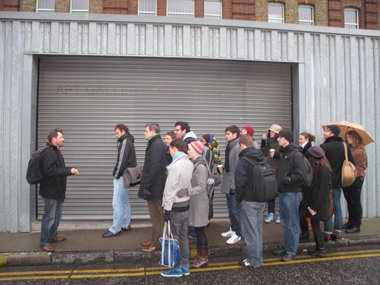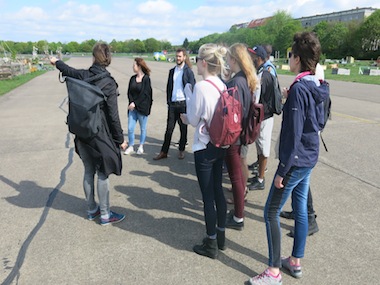What distinguishes your programme?
UCL has an unrivalled array of world-leading expertise in urban teaching and research that straddles the whole spectrum of urban studies. This is drawn upon in the Urban Studies MSc to develop innovative interdisciplinary and critical approaches to urban issues and debates. The programme compares and contrasts a broad range of urban contexts across global South and North while taking advantage of its location in the heart of one of the world’s great metropolises. Furthermore, students benefit from several staff being closely involved with the programme who are always eager to meet to discuss concerns, share experiences or develop ideas.
It’s been a while since I was at University, how will I find the programme?We are keen to recruit across all age groups, whether that is students who have just finished undergraduate courses or people who are looking for a new challenge. We have an important cohort of students who enrol as ‘flexi-time’ students and combine studies with their professional or family life. Recognising that for many students it has been several years since they wrote a formal academic essay, we provide feedback and advice through a ‘formative’ essay set mid-way through term 1.
I don’t have a background in urban geography, planning or architecture, should I still apply?We have students with an impressive array of disciplinary backgrounds. We have students who studied not just geography, architecture and planning as undergraduates but sociology, philosophy, art history, archaeology, fine art, linguistics, economics, engineering and anthropology. What we are looking for is not necessarily students from a particular academic route but those with the intellectual curiosity and enthusiasm for studying and researching cities and urban life across a broad array of disciplinary approaches.
How long has the programme been running?It was started in 2008 as an initiative of the cross-disciplinary
UCL Urban Laboratory. The programme is administered through the UCL Department of Geography (which is why it is a MSc and not a MA degree).
Where do your students come from?The student group is international, which facilitates greater opportunities to compare and contrast examples and ideas across the class. Beyond the UK, no one country dominates. Our students have come from countries including Indonesia, Brazil, Canada, South Africa, Switzerland, Japan, Italy, China, Greece, Germany, United States, Argentina, Turkey, India, Ireland and Russia.
What do your students go on to do?Given the wide background of students we recruit, there is no one particular path. About 15% return to their professional careers (for example in journalism, architecture, graphics design, transport planning). Another 15% or so continue into PhD research, and we have an impressive record of students finding funding whether at UCL or elsewhere. Other graduates have found employment in, amongst other sectors, municipal and local government, urban political organisations, art consultancies, financial services, social enterprise companies, cultural institutions, community development organisations and think-tanks. There is a well-resourced careers service at UCL which we encourage students to use.
Is there any overseas field-trip?Currently we do not organise one. It would further raise the cost of studying on the programme and we have found students are generally more interested in exploring London in field-visits and teaching exercises, especially as many are new to the city. However, we have assisted students in organising their own trips abroad or within the UK. And we did run a week to Berlin in May 2015 as part of the Urban Lab+ network. See
here for the full write up.
What are you looking for in my application?
It is important you have a strong academic record and references, but we are also looking to recruit students with relevant professional experience. We also make sure you do not have a generic personal statement and are clear why you are keen to study on this particular programme.
I’m keen to develop my research beyond traditional academic formatsWe place particular emphasis on developing critical engagement with existing academic literature, but we welcome careful and rigorous experiments in writing and methodology. Students have produced work that features sound-recordings, web-design, art interventions and film-clips. Some of this has featured in the UCL Urban Lab’s annual
CitiesMethodologies exhibition.
I’m thinking of applying as a part-time student, what is the commitment during the first-year?Full time students take four modules in both term 1 (Sept-Dec) and term 2 (Jan-April), whereas part-time students take two in each term. We also have the flexi- option which can be used to tailor module selection over 2-5 years. All students are expected ideally to take the two core options, Urban Imaginations and Cities, Space and Power, in their first term, and the Urban Practices module in their second term. Modules tend to involve at least 2-3 hours of teaching/seminars each week (so at least 20 hours over the term) with around 130 hours recommended for private reading and written work for each module – although there is some variability.
Can I take other Masters optional modules at UCL which are not listed on this Urban Studies MSc site?Yes, we are keen to allow you to develop your own particular cross-disciplinary engagement with topics that especially interest you - as long as the convenor of the module allows you to enrol and there are no clashes with core teaching on the MSc Urban Studies.
Great - I'd like to start doing some reading beforehand, what do you recommend?Given the broad array of approaches, ideas and cities explored on this programme there's no definitive general book but
here are some suggestions from our alumni. Do take a look at some of the suggested readings on the two core modules in term one
here, as well as looking through readings given for some of the
optional modules you might be interested in. If you have access to academic journals, scan through
CITY,
Urban Studies or the
International Journal of Urban and Regional Research for some of the latest academic thinking. If your library has
this book then this provides a good wide-ranging introduction to many of the key debates you will encounter. And
Urban Constellations and
Engaged Urbanism contains short chapters by many of the staff who will teach you.
I’ve got further questions...
For questions about the application process please contact geog-masters@ucl.ac.uk For any questions about the format or content of the programme, please contact Dr Andrew Harris (andrew.harris@ucl.ac.uk) who is also happy to meet or talk via Skype.

